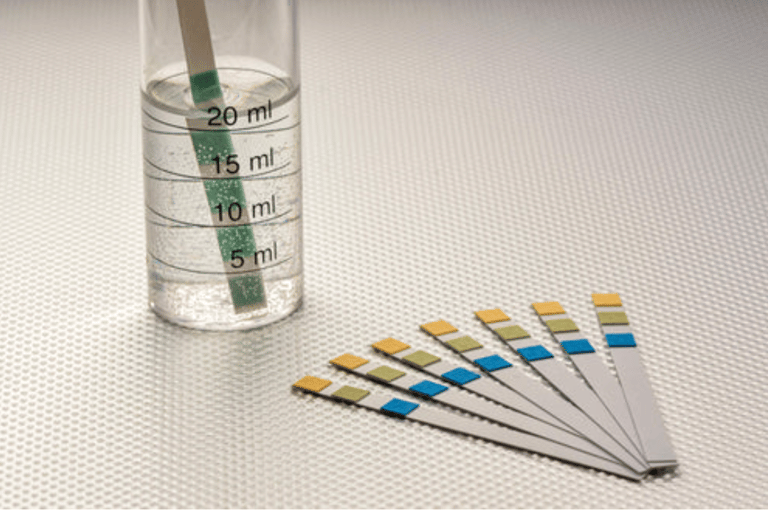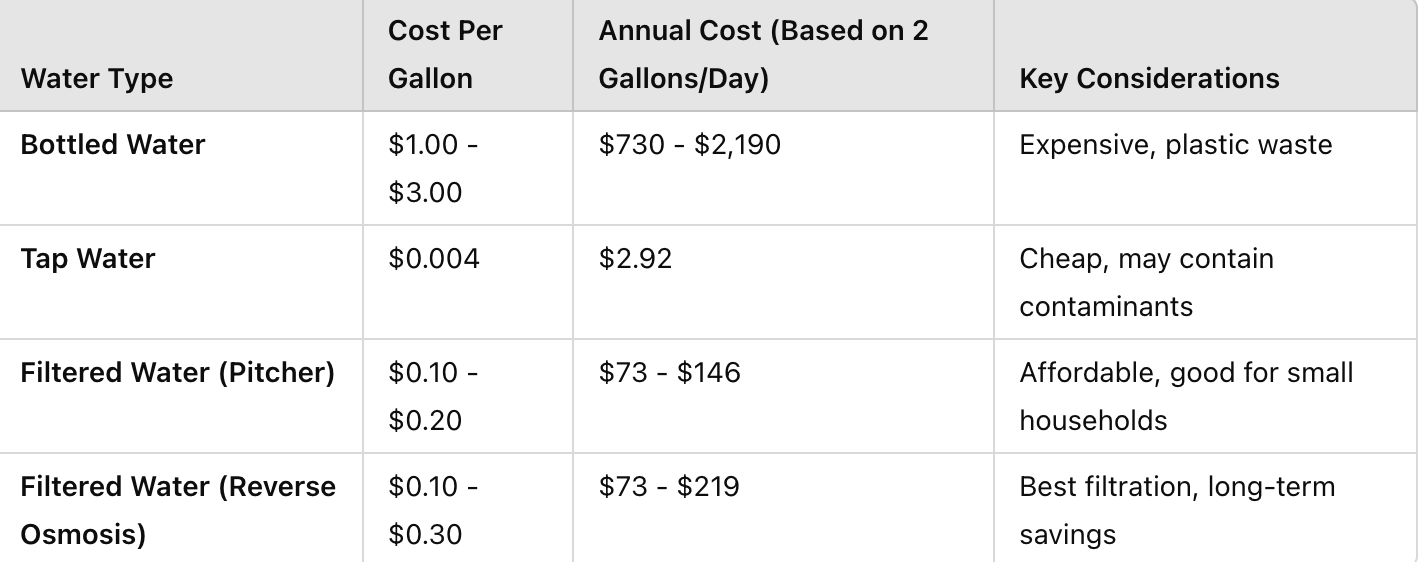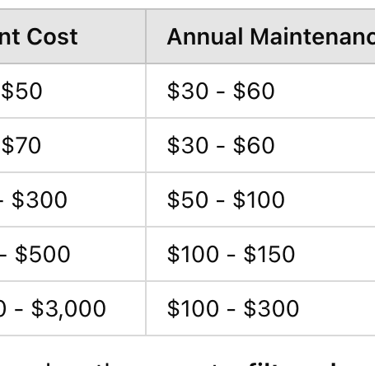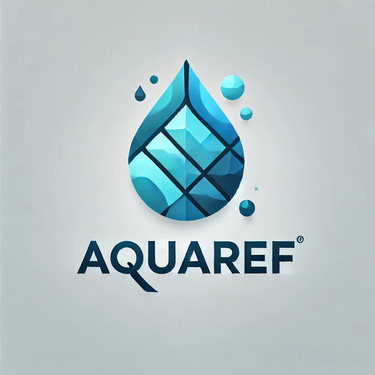Is Filtered Water Cheaper? A Cost Comparison Guide
Many people wonder, "Is filtered water cheaper?" when weighing the costs of bottled water, tap water, and water filtration systems. While tap water is the least expensive option, it may contain chlorine, heavy metals, and other contaminants that affect its safety and taste. Bottled water, on the other hand, is significantly more costly over time and contributes to plastic waste. Filtered water offers a cost-effective and sustainable solution by providing clean, safe, and great-tasting water without the high cost of bottled alternatives. In this article, we’ll break down the true cost of filtered water, compare it to bottled and tap water, and determine whether investing in a water filtration system is the smartest financial decision for your home.
2/4/20257 min read


Introduction
Many people wonder, “Is filtered water cheaper?” when deciding between tap water, bottled water, and water filtration systems. While tap water is the most affordable option, it may contain impurities, chlorine, heavy metals, and bacteria. Bottled water, on the other hand, is significantly more expensive over time and generates plastic waste.
Filtered water offers a cost-effective and sustainable solution, providing cleaner, better-tasting water while eliminating the recurring expense of bottled water. But is it really cheaper in the long run?
In this article, we’ll compare the cost of filtered water vs. bottled and tap water, explore different filtration systems, and break down whether investing in a water filter actually saves money.
The True Cost of Different Water Sources
When considering "Is filtered water cheaper?", it's important to compare the costs of filtered water, bottled water, and tap water. Each option has different upfront costs, recurring expenses, and long-term financial impact. Below, we break down how much each type of water truly costs per gallon and per year.
Cost Comparison: Filtered Water vs. Bottled Water vs. Tap Water
To understand the true cost, let's look at the average price per gallon and yearly expenses for each water source.
Water Type Cost Per Gallon Annual Cost (Based on 2 Gallons/Day) Key Considerations Bottled Water $1.00 - $3.00 $730 - $2,190 Expensive, plastic waste Tap Water $0.004 $2.92 Cheap, may contain contaminants Filtered Water (Pitcher) $0.10 - $0.20 $73 - $146 Affordable, good for small households Filtered Water (Reverse Osmosis) $0.10 - $0.30 $73 - $219 Best filtration, long-term savings
Why Bottled Water is the Most Expensive Option
Bottled water is convenient but comes at a high cost—both financially and environmentally. The price of a single bottled water ($1 - $3 per bottle) may not seem like much, but it adds up quickly over time.
🔹 Hidden Costs of Bottled Water:
✅ Recurring purchase costs – A 24-pack of bottled water ($5 - $20) lasts just a few days.
✅ Environmental cost – Plastic waste from bottled water is a major issue.
✅ Less regulation – Bottled water is not always safer than tap or filtered water.
💡 Where to add images:
A pile of discarded plastic water bottles to highlight the environmental impact.
Tap Water: The Cheapest, But Is It Safe?
Tap water is by far the cheapest option, costing only fractions of a cent per gallon. However, it may contain chlorine, heavy metals, and bacteria, depending on the local water supply.
🔹 Pros of Tap Water:
✔ Extremely affordable – Less than $3 per year for most households.
✔ Easily accessible – No setup or purchases required.
🔹 Cons of Tap Water:
✖ Potential contamination – Aging pipes can introduce lead and heavy metals.
✖ Chlorine & Fluoride – Added for disinfection but affects taste.
✖ Odor & Taste Issues – Many people dislike the chlorine aftertaste.
Filtered Water: The Best Balance of Cost and Quality
Filtered water provides a cost-effective middle ground between bottled and tap water. By removing contaminants and improving taste, it offers high-quality drinking water at a fraction of the cost of bottled water.
🔹 Pros of Filtered Water:
✔ Affordable – Costs range from $0.10 to $0.30 per gallon, depending on the system.
✔ Removes contaminants – Eliminates chlorine, lead, PFAS, and other impurities.
✔ Better taste – No chlorine odor or metallic aftertaste.
🔹 Types of Water Filtration Systems & Their Costs:
💧 Water Filter Pitchers – $30 upfront + $6–$12 for replacement filters every 2-3 months.
💧 Faucet Filters – $40–$70 upfront + $15–$30 replacement every 3-6 months.
💧 Reverse Osmosis (RO) Systems – $200–$500 upfront + $100–$150 annual maintenance.
💡 Where to add images:
A side-by-side image of a water filter pitcher, faucet filter, and reverse osmosis system to show different options.
Final Thoughts on Water Costs
So, is filtered water cheaper? The answer depends on what you're comparing it to:
✅ Filtered water is MUCH cheaper than bottled water, offering savings of hundreds or even thousands of dollars per year.
✅ Filtered water is slightly more expensive than tap water, but it provides better quality, taste, and health benefits.
✅ Investing in a water filter pays for itself over time and reduces reliance on single-use plastic bottles.
Types of Water Filtration Systems & Their Costs
When considering "Is filtered water cheaper?", it's essential to understand the different types of water filtration systems and their associated costs. While all filters improve water quality, they vary in upfront cost, maintenance expenses, and effectiveness. Below, we break down the most common types of water filtration systems, how they work, and whether they offer long-term savings compared to bottled water and tap water.
1. Water Filter Pitchers – Most Affordable & Convenient
💰 Cost: $30 - $50 (upfront) | $6 - $12 per replacement filter (every 2-3 months)
🚰 Best For: Individuals & small households
Water filter pitchers are an affordable and beginner-friendly option for filtering tap water. They use activated carbon filters to reduce chlorine, sediment, and some heavy metals, improving taste and odor.
✅ Pros:
✔ Low upfront cost
✔ No installation required
✔ Portable & easy to use
❌ Cons:
✖ Filters need frequent replacements (adds long-term costs)
✖ Limited filtration capacity (not effective for fluoride, bacteria, or heavy metals)
💡 Verdict: Cheaper than bottled water, but replacement filters can add up over time.
2. Faucet-Mounted Water Filters – Easy & Budget-Friendly
💰 Cost: $40 - $70 (upfront) | $15 - $30 per replacement filter (every 3-6 months)
🚰 Best For: Renters, small households
These attach directly to a faucet, filtering water on demand. They work similarly to pitcher filters but provide continuous filtration without waiting for water to pass through a pitcher.
✅ Pros:
✔ More effective than pitchers (removes lead, chlorine, and sediments)
✔ No need for a separate water container
✔ Quick installation
❌ Cons:
✖ Slows down water flow
✖ Filters need frequent replacement
💡 Verdict: A cost-effective, space-saving solution that provides filtered water on demand.
3. Under-Sink Water Filters – Great Balance of Cost & Performance
💰 Cost: $100 - $300 (upfront) | $50 - $100 per replacement filter (annually)
🚰 Best For: Medium to large households
Under-sink filtration systems are installed directly beneath your sink and connect to your water line. They use multi-stage filtration to remove chlorine, fluoride, lead, bacteria, and VOCs (volatile organic compounds).
✅ Pros:
✔ Higher filtration capacity than pitchers or faucet filters
✔ Removes more contaminants (great for areas with questionable tap water quality)
✔ Less frequent filter replacements (saves money long-term)
❌ Cons:
✖ Requires installation (may need professional help)
✖ Higher upfront cost
💡 Verdict: A great investment that provides high-quality filtered water at a lower cost per gallon compared to bottled water.
4. Reverse Osmosis (RO) Systems – Most Effective for Purity
💰 Cost: $200 - $500 (upfront) | $100 - $150 per year for maintenance
🚰 Best For: Households with high water consumption & contamination concerns
Reverse Osmosis (RO) systems use a multi-stage filtration process that includes sediment filters, carbon filters, and a semi-permeable membrane. This removes up to 99% of contaminants, including lead, arsenic, fluoride, bacteria, and microplastics.
✅ Pros:
✔ Provides the purest drinking water
✔ Cost-effective over time compared to bottled water
✔ Ideal for families who need safe, high-quality water
❌ Cons:
✖ High upfront cost
✖ Wastes some water in the filtration process (though modern RO systems minimize this)
💡 Verdict: A premium choice for those wanting the cleanest water and long-term savings.
5. Whole-House Water Filtration Systems – For Maximum Home Protection
💰 Cost: $1,000 - $3,000 (upfront) | $100 - $300 per year for maintenance
🚰 Best For: Homes with well water or serious contamination concerns
These systems filter water for the entire house, protecting plumbing, appliances, and drinking water. They often use a combination of sediment filtration, activated carbon, and UV purification to remove contaminants before they enter the home.
✅ Pros:
✔ Provides clean water for drinking, cooking, bathing, and laundry
✔ Great for well water (removes iron, sediment, and bacteria)
✔ Increases appliance lifespan by reducing sediment buildup
❌ Cons:
✖ Very high upfront cost
✖ Requires professional installation
💡 Verdict: Ideal for homeowners wanting complete water filtration, but not necessary for everyone.
Cost Comparison of Water Filtration Systems
Filter Type Upfront Cost Annual Maintenance Cost Best For Pitcher Filter $30 - $50 $30 - $60 Small households Faucet Filter $40 - $70 $30 - $60 Renters, apartments Under-Sink Filter $100 - $300 $50 - $100 Medium households Reverse Osmosis $200 - $500 $100 - $150 High-purity needs Whole-House System $1,000 - $3,000 $100 - $300 Full home filtration
💡 Is Filtered Water Cheaper? Based on these costs, filtered water is significantly cheaper than bottled water over time. Even with maintenance, most filtration systems pay for themselves in 6-12 months compared to the cost of regularly buying bottled water.
Final Thoughts: Which Water Filtration System is Right for You?
So, is filtered water cheaper? Yes—but the cost depends on the system you choose.
✅ If you’re on a budget, a water filter pitcher is an affordable choice.
✅ For a more permanent solution, an under-sink or RO system provides better filtration at a lower cost per gallon.
✅ For whole-home protection, a whole-house filtration system is the best long-term investment.
Why Filtered Water is the Best Balance of Cost & Quality
Filtered water is cheaper than bottled water while still providing clean, great-tasting water. Here’s why it’s the best choice:
✅ Saves Money – A one-time investment in a water filter reduces recurring water expenses.
✅ Removes Contaminants – Filters remove chlorine, lead, bacteria, and heavy metals, making water safer to drink.
✅ Eco-Friendly – Reduces plastic waste from bottled water and lowers carbon footprint.
✅ Convenient – No need to buy, store, or carry heavy bottled water cases.
Bottled water is convenient, but at a high cost—both financially and environmentally. On the other hand, filtered water offers a cost-effective and sustainable solution without compromising on quality.
Final Answer: Is Filtered Water Cheaper? YES!
💰 Filtered water is much cheaper than bottled water and provides better water quality than tap water. Even after considering maintenance costs, a filtration system pays for itself quickly and offers long-term savings.
If you’re looking to cut costs, improve water quality, and reduce plastic waste, investing in a good water filtration system is a smart financial and health-conscious decision.
Start Saving Money on Clean Drinking Water Today!






Filters
Your source for quality water filtration solutions.
contact information
Service
info@aquaref.shop
+1(503) 974-6487
© 2024. All rights reserved.
Quick links
530B Harkle Rd, STE 100
Santa Fe, NM 87505
Working Hours: Mon-Sun: 10 am – 5 pm (EST)
